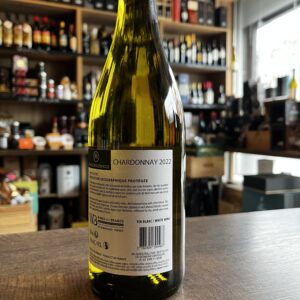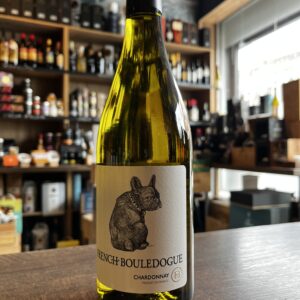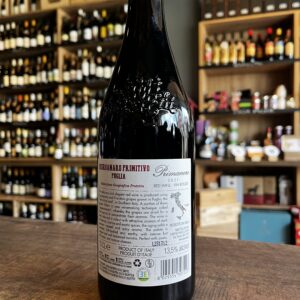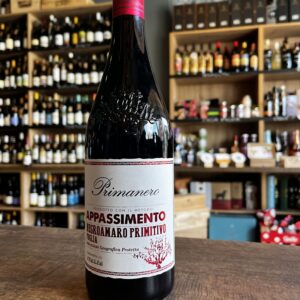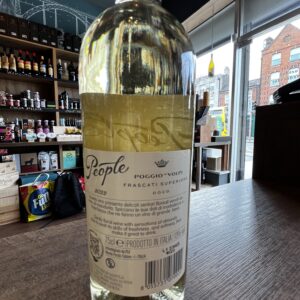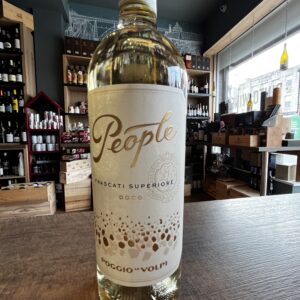-
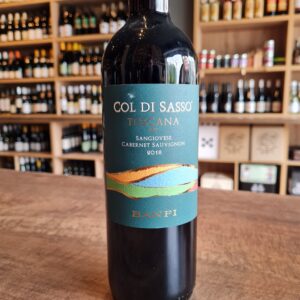 Col di Sasso meaning Stony Hill – the blend of Cabernet Sauvignon and Sangiovese cultivated on the most rocky and impervious slopes of the Banfi estate in Montalcino. A young, but intense wine. The color is ruby red with purple shades. The wine shows intense and fruity scents of black currant, cherry and other red fruits. The structure is soft and magnificently sustained by a good acidity, resulting from the sweet and mellow tannins. The finish is pleasant and with a balanced complexity.
Col di Sasso meaning Stony Hill – the blend of Cabernet Sauvignon and Sangiovese cultivated on the most rocky and impervious slopes of the Banfi estate in Montalcino. A young, but intense wine. The color is ruby red with purple shades. The wine shows intense and fruity scents of black currant, cherry and other red fruits. The structure is soft and magnificently sustained by a good acidity, resulting from the sweet and mellow tannins. The finish is pleasant and with a balanced complexity. -
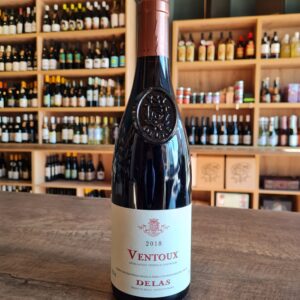 Delas Frères Ventoux is a red wine blend made with grapes from the south eastern region of the Rhône winegrowing region of France. Delas Frères are one of the most prestigious Rhone wine producers and make superb wines, from a wide selection of appellations, in both the northern and southern Rhône including Hermitage, Crozes-Hermitage, Châteauneuf-du-Pape, Côte Rôtie, Condrieu and Côtes-du-Rhône. The company was founded in 1835 when Charles Audibert and Philippe Delas bought Maisons Junique, a 40-year-old winery which they renamed Audibert & Delas. Philippe Delas had two sons, Henri and Florentin. The latter married the daughter of Charles Audibert, further strengthening the bond between the two families. In 1924, the brothers succeeded to the founders and changed the name of the house to Delas Frères. The company grew and in 1981 relocated to the its current premises in Saint Jean de Muzols, a small village located two kilometers north of Tournon in the Saint Joseph appellation. In 1993 Delas Frères became part of the Champagne Louis Roederer group. Delas Frères Ventoux is a blend of Grenache and Syrah grapes which are sourced from the communes of Mazan and Goult from vineyards which stretch out along the left bank of the Rhône river, around the limestone outcrop of the Mount Ventoux. The Grenache grapes are fermented in stainless steel vats with a daily pumping over to allow gentle extraction of the phenolic components. The Syrah is sometimes left on the stems in order to fully express its characteristic fruit aromas. The two components are blended before they wines is matured for 6 to 8 months in Delas’ air-conditioned winery before bottling.
Delas Frères Ventoux is a red wine blend made with grapes from the south eastern region of the Rhône winegrowing region of France. Delas Frères are one of the most prestigious Rhone wine producers and make superb wines, from a wide selection of appellations, in both the northern and southern Rhône including Hermitage, Crozes-Hermitage, Châteauneuf-du-Pape, Côte Rôtie, Condrieu and Côtes-du-Rhône. The company was founded in 1835 when Charles Audibert and Philippe Delas bought Maisons Junique, a 40-year-old winery which they renamed Audibert & Delas. Philippe Delas had two sons, Henri and Florentin. The latter married the daughter of Charles Audibert, further strengthening the bond between the two families. In 1924, the brothers succeeded to the founders and changed the name of the house to Delas Frères. The company grew and in 1981 relocated to the its current premises in Saint Jean de Muzols, a small village located two kilometers north of Tournon in the Saint Joseph appellation. In 1993 Delas Frères became part of the Champagne Louis Roederer group. Delas Frères Ventoux is a blend of Grenache and Syrah grapes which are sourced from the communes of Mazan and Goult from vineyards which stretch out along the left bank of the Rhône river, around the limestone outcrop of the Mount Ventoux. The Grenache grapes are fermented in stainless steel vats with a daily pumping over to allow gentle extraction of the phenolic components. The Syrah is sometimes left on the stems in order to fully express its characteristic fruit aromas. The two components are blended before they wines is matured for 6 to 8 months in Delas’ air-conditioned winery before bottling. -
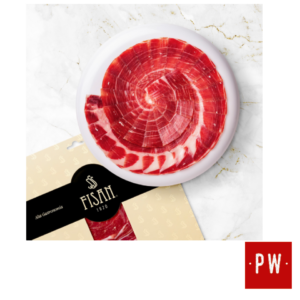 One of FISAN’s most prized products in a practical format to delight your palate with the most extraordinary nuances of 100% Iberico Bellota Ham Alta Gastronomia at any time and place. Its secret: the selection from the earliest stage of the best pure Iberico breed pigs, patience and curing in our natural cellars in Guijuelo, which leads to the best Pata Negra Ham you will ever remember. Only the most exceptional pieces qualify as Alta Gastronomia.
One of FISAN’s most prized products in a practical format to delight your palate with the most extraordinary nuances of 100% Iberico Bellota Ham Alta Gastronomia at any time and place. Its secret: the selection from the earliest stage of the best pure Iberico breed pigs, patience and curing in our natural cellars in Guijuelo, which leads to the best Pata Negra Ham you will ever remember. Only the most exceptional pieces qualify as Alta Gastronomia. -
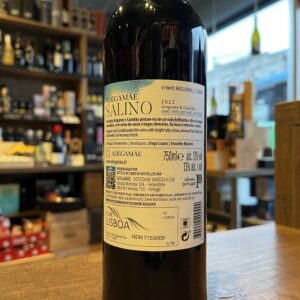
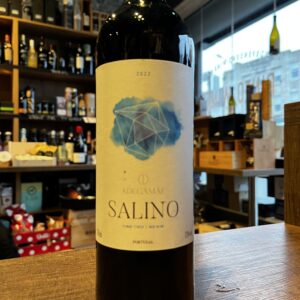 Salino is from north from Lisbon (Torres Vedras) and just a step away from the ocean, AdegaMãe brings out the best of a terroir strongly influenced by the prevailing sea breezes, standing out for its Atlantic-inspired wines, brimming with character, freshness and minerality. The winery was built by the Alves family, founder of Riberalves Group, AdegaMãe is born as a tribute from the men to the family’s matriarch, Manuela Alves. On this particular project, 2 star winemakers were asked to do an everydays wine that brings quality and immediate expression to the palate. Pair it with Charcuterie of all sorts, red meats and stews
Salino is from north from Lisbon (Torres Vedras) and just a step away from the ocean, AdegaMãe brings out the best of a terroir strongly influenced by the prevailing sea breezes, standing out for its Atlantic-inspired wines, brimming with character, freshness and minerality. The winery was built by the Alves family, founder of Riberalves Group, AdegaMãe is born as a tribute from the men to the family’s matriarch, Manuela Alves. On this particular project, 2 star winemakers were asked to do an everydays wine that brings quality and immediate expression to the palate. Pair it with Charcuterie of all sorts, red meats and stews -
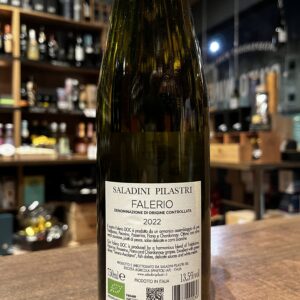
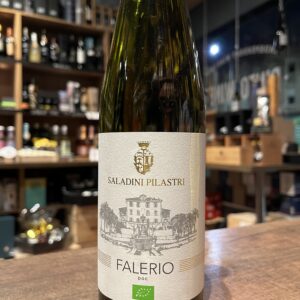 Saladini Pilastri is located in Spinetoli, in the Marche region of Italy . The history of the Counts Saladini Pilastri, a noble family from Ascoli Piceno, dates back to the early 1000s, but it is only for around 300 years that the family has been dedicated to wine production. Its 320 hectare wine estate is located in the heart of the Rosso Piceno production area. From the 1970s, new vines were planted; The current winery was built next to the splendid 15th century country house “Vigna Palazzi”, which originally served as a production site, so that all production could be kept in one place. The vineyard has been certified in organic farming since 1994. The climate here is Mediterranean, with hot, dry summers tempered by the maritime influence of the Adriatic Sea only 8km away from the vineyards. All the farming is organic and the winery is equipped with all the latest wine-making mod cons, helping speeding up the complex time of production and maintain quality. In true Italian style-Great wine with great food it helps that at the heart of the estate is a plush mansion house with a sweet swimming pool!. True quality of life. If I wasn't Portuguese, Italy would be where I would retire. Food-friendly as they come, its easy-going qualities match well with antipasti or even creamy pasta dishes but especially fish orientated dishes. Goditi il Vino!
Saladini Pilastri is located in Spinetoli, in the Marche region of Italy . The history of the Counts Saladini Pilastri, a noble family from Ascoli Piceno, dates back to the early 1000s, but it is only for around 300 years that the family has been dedicated to wine production. Its 320 hectare wine estate is located in the heart of the Rosso Piceno production area. From the 1970s, new vines were planted; The current winery was built next to the splendid 15th century country house “Vigna Palazzi”, which originally served as a production site, so that all production could be kept in one place. The vineyard has been certified in organic farming since 1994. The climate here is Mediterranean, with hot, dry summers tempered by the maritime influence of the Adriatic Sea only 8km away from the vineyards. All the farming is organic and the winery is equipped with all the latest wine-making mod cons, helping speeding up the complex time of production and maintain quality. In true Italian style-Great wine with great food it helps that at the heart of the estate is a plush mansion house with a sweet swimming pool!. True quality of life. If I wasn't Portuguese, Italy would be where I would retire. Food-friendly as they come, its easy-going qualities match well with antipasti or even creamy pasta dishes but especially fish orientated dishes. Goditi il Vino! -
Out of stock
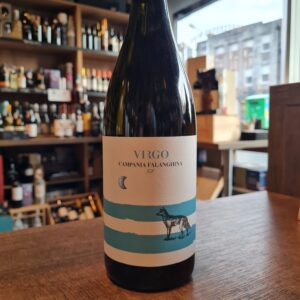 Villa Raiano was founded in 1996 in the old factories of the Basso family's oil mill, owner of the company in the Raiano hamlet of the municipality of Serino (AV). Built in 2009, the is structure perfectly integrated into the surrounding environment, surrounded by vineyards and woods. On top of it a panoramic terrace overlooking a wonderful valley carved by the river Sabato which descends proudly from Monte Terminio. This delicious summer wine from the extreme south of Italy makes you long for Italy. A delicious, light-footed summer wine with a sultry taste of honey, flowers and fresh notes of citrus fruits. The Falanghina grape is still relatively unknown in the Ireland, but in Italy a guarantee for a smooth summer wine that can be drunk on it's own or over lunch.The artisan winemakers of Villa Raiano are behind this fantastic Virgo Falanghina, you can expect high quality. In addition, all grapes are picked by hand by Gabrizia and her brothers. And you can taste it! A delicious traditional wine that is made with the utmost care in a sustainable way.
Villa Raiano was founded in 1996 in the old factories of the Basso family's oil mill, owner of the company in the Raiano hamlet of the municipality of Serino (AV). Built in 2009, the is structure perfectly integrated into the surrounding environment, surrounded by vineyards and woods. On top of it a panoramic terrace overlooking a wonderful valley carved by the river Sabato which descends proudly from Monte Terminio. This delicious summer wine from the extreme south of Italy makes you long for Italy. A delicious, light-footed summer wine with a sultry taste of honey, flowers and fresh notes of citrus fruits. The Falanghina grape is still relatively unknown in the Ireland, but in Italy a guarantee for a smooth summer wine that can be drunk on it's own or over lunch.The artisan winemakers of Villa Raiano are behind this fantastic Virgo Falanghina, you can expect high quality. In addition, all grapes are picked by hand by Gabrizia and her brothers. And you can taste it! A delicious traditional wine that is made with the utmost care in a sustainable way. -
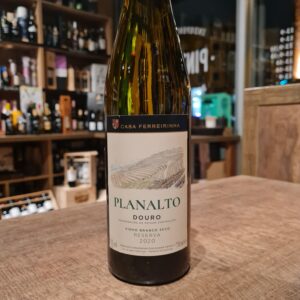 Planalto is one of the biggest references of white wine in the Douro Demarcated Region, fruit of the in-depth studies carried out over the years, the careful choice of the grape varieties that compose it and the use of the best winemaking technology in its production. This white blend comes from high-altitude vineyards above the river Douro. The soil in the Douro Valley is schistous; a slate-like metamorphic rock that fractures vertically - allowing vine roots to dig deep to access water and nutrients to sustain them through the hot Douro summers. The poor quality of the soil forces the grapes to produce low yields of grapes with a great concentration of flavour. The grapes were harvested by hand and were selected for their balance between flavour intensity and freshness. Ideal to accompany fish, seafood and white meat dishes.
Planalto is one of the biggest references of white wine in the Douro Demarcated Region, fruit of the in-depth studies carried out over the years, the careful choice of the grape varieties that compose it and the use of the best winemaking technology in its production. This white blend comes from high-altitude vineyards above the river Douro. The soil in the Douro Valley is schistous; a slate-like metamorphic rock that fractures vertically - allowing vine roots to dig deep to access water and nutrients to sustain them through the hot Douro summers. The poor quality of the soil forces the grapes to produce low yields of grapes with a great concentration of flavour. The grapes were harvested by hand and were selected for their balance between flavour intensity and freshness. Ideal to accompany fish, seafood and white meat dishes. -
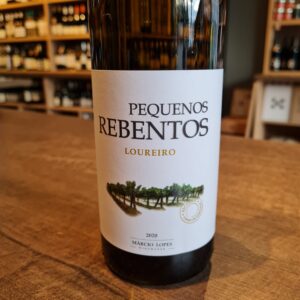 Márcio Lopes studied as an engineer, but cut his winemaking teeth working for two years with Vinho Verde master Anselmo Mendes in Melgaço. He then travelled to Australia where he made wine in Rutherglen and Tasmania, another cool climate region. He returned to Portugal in 2010 to start his own projects, including Pequenos Rebentos in Vinho Verde. He initially started working with Alvarinho and Trajadura (known as Albariño and Treixadura in Spain) from the sub-regions of Monção and Melgaço. These areas have a very particular microclimate, with slightly less Atlantic influence than the rest of the region - winters are cold with moderate rainfall and summers are hot and dry. During 2016 he also started to grow and vinify local varietals Loureiro. He now farms 5ha of vineyards, planted on granite, as well as buying some grapes from selected growers who also work in the same sustainable way and without herbicides. His winemaking is low intervention, he ferments using natural yeasts, and like many of our producers he believes that if the fruit is good enough he will make quality wines with balance that reflect his terroir. This seems to be working - his wines are distinctively fresh and vibrant, showing bright and clear typical variety aromas.
Márcio Lopes studied as an engineer, but cut his winemaking teeth working for two years with Vinho Verde master Anselmo Mendes in Melgaço. He then travelled to Australia where he made wine in Rutherglen and Tasmania, another cool climate region. He returned to Portugal in 2010 to start his own projects, including Pequenos Rebentos in Vinho Verde. He initially started working with Alvarinho and Trajadura (known as Albariño and Treixadura in Spain) from the sub-regions of Monção and Melgaço. These areas have a very particular microclimate, with slightly less Atlantic influence than the rest of the region - winters are cold with moderate rainfall and summers are hot and dry. During 2016 he also started to grow and vinify local varietals Loureiro. He now farms 5ha of vineyards, planted on granite, as well as buying some grapes from selected growers who also work in the same sustainable way and without herbicides. His winemaking is low intervention, he ferments using natural yeasts, and like many of our producers he believes that if the fruit is good enough he will make quality wines with balance that reflect his terroir. This seems to be working - his wines are distinctively fresh and vibrant, showing bright and clear typical variety aromas. -
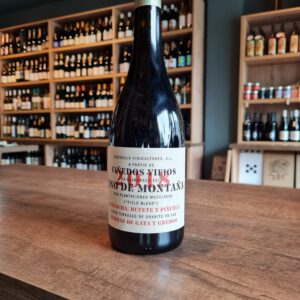 Vinos de Montaña is from a range of mountain wines on high-altitude vineyards in Sierra de Gredos and other historic growing areas in the Sistema Central, the mountain chain that divides the Iberian Peninsula in its Northern and Southern halves. Based mostly on very old Garnacha vines on granite soil, the wines are perfumed, delicate and fresh, displaying the character of their vineyard parcels and villages. This organic wine even though is from a recent created bodega/company, is from old vines revived in the mountain where wine was produced for decades. The Spanish market seemed to picked up on it, as it is becoming increasingly popular with the new enthusiastic wine drinkers generation. Recommended pairing with grilled vegetables, sausages, roasted meats, small game, cured cheeses.
Vinos de Montaña is from a range of mountain wines on high-altitude vineyards in Sierra de Gredos and other historic growing areas in the Sistema Central, the mountain chain that divides the Iberian Peninsula in its Northern and Southern halves. Based mostly on very old Garnacha vines on granite soil, the wines are perfumed, delicate and fresh, displaying the character of their vineyard parcels and villages. This organic wine even though is from a recent created bodega/company, is from old vines revived in the mountain where wine was produced for decades. The Spanish market seemed to picked up on it, as it is becoming increasingly popular with the new enthusiastic wine drinkers generation. Recommended pairing with grilled vegetables, sausages, roasted meats, small game, cured cheeses. -
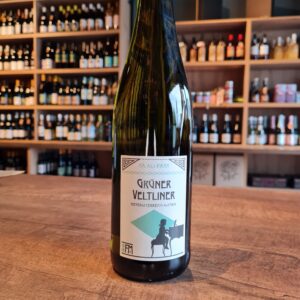 Gruner Veltliner is Austria’s most important indigenous grape and up until the 1990s it was relatively unheard of. Gruner Veltliner has many charms, one of them being the consistency of the quality and the flavour profile; it always delivers what it says on the tin. Ferdinand Mayr is a musician turned winemaker and his organic wines are singing with flavour and intensity. Whoever says Grüner Veltliner says Austria and vice versa. This version of Ferdinand Mayr is accessible and it charms you right away. Exuberant, lively nose of citrus, apple and white pepper. On the palate, the ripe fruit and spiciness create a pleasant tension with the acidity. Crispy and ripe, as if you were biting into a juicy apple. Flavor and spiciness characterize this wine. Fantastic with Japanese or Thai cuisine.
Gruner Veltliner is Austria’s most important indigenous grape and up until the 1990s it was relatively unheard of. Gruner Veltliner has many charms, one of them being the consistency of the quality and the flavour profile; it always delivers what it says on the tin. Ferdinand Mayr is a musician turned winemaker and his organic wines are singing with flavour and intensity. Whoever says Grüner Veltliner says Austria and vice versa. This version of Ferdinand Mayr is accessible and it charms you right away. Exuberant, lively nose of citrus, apple and white pepper. On the palate, the ripe fruit and spiciness create a pleasant tension with the acidity. Crispy and ripe, as if you were biting into a juicy apple. Flavor and spiciness characterize this wine. Fantastic with Japanese or Thai cuisine. -
Out of stock
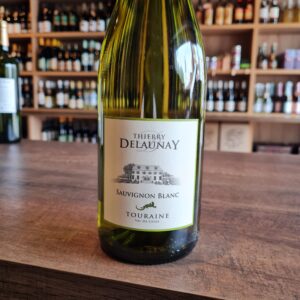 Touraine is the savvy place to look if you’re after a Sauvignon blanc which combines great value with great flavour. The Loire is Sauvignon Blanc’s homeland. So it’s no surprise that Loire native, Thierry Delaunay, is passionate about the grape. Decades of his family making wine in the region means he has the pick of the crop when it comes to choosing grapes for his wines. He looks for the best grapes from the best pockets of vines in Touraine – and the results speak for themselves. This Sauvignon is seriously refreshing, seriously citrusy, and seriously good value. You’ll find nothing finer to pair with a goat’s cheese tart. And its more restrained flavour profile makes it a perfect party wine. Santé.
Touraine is the savvy place to look if you’re after a Sauvignon blanc which combines great value with great flavour. The Loire is Sauvignon Blanc’s homeland. So it’s no surprise that Loire native, Thierry Delaunay, is passionate about the grape. Decades of his family making wine in the region means he has the pick of the crop when it comes to choosing grapes for his wines. He looks for the best grapes from the best pockets of vines in Touraine – and the results speak for themselves. This Sauvignon is seriously refreshing, seriously citrusy, and seriously good value. You’ll find nothing finer to pair with a goat’s cheese tart. And its more restrained flavour profile makes it a perfect party wine. Santé. -
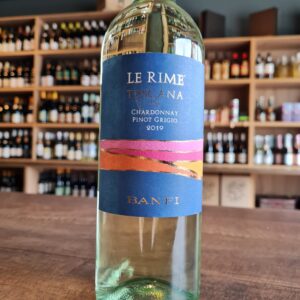 The Le Rime appears pale yellow with green highlights, with intense aromas of green fruit followed by zippy citrus on the nose. The palate is fresh and lively with ripe pear and juicy green apple in abundance, finishing clean and full with persistent fruit and citrus cream, particularly fetching but do not overchill and allow to open in the glass. Best consumed young and would be ideal with fresh fish and summer salads.
The Le Rime appears pale yellow with green highlights, with intense aromas of green fruit followed by zippy citrus on the nose. The palate is fresh and lively with ripe pear and juicy green apple in abundance, finishing clean and full with persistent fruit and citrus cream, particularly fetching but do not overchill and allow to open in the glass. Best consumed young and would be ideal with fresh fish and summer salads. -
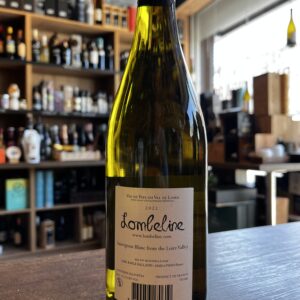
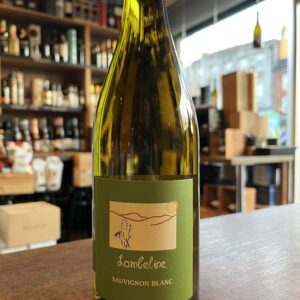 This estate spans a modest 9 hectares, with 1 hectare located in Sancerre and the remaining 8 in the Coteaux du Giennois. Emile's vineyard holdings in the Giennois region are situated in the picturesque villages of Bonny-sur-Loire and Beaulieu-sur-Loire, where the vineyards gently ascend from the banks of the Loire River. It is from these calcareous soils, enriched with underlying layers of silex and clay, that Emile crafts the wines
This estate spans a modest 9 hectares, with 1 hectare located in Sancerre and the remaining 8 in the Coteaux du Giennois. Emile's vineyard holdings in the Giennois region are situated in the picturesque villages of Bonny-sur-Loire and Beaulieu-sur-Loire, where the vineyards gently ascend from the banks of the Loire River. It is from these calcareous soils, enriched with underlying layers of silex and clay, that Emile crafts the wines -
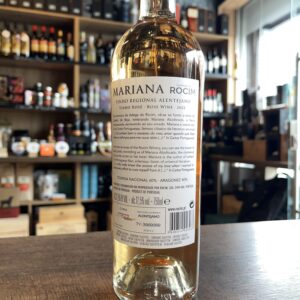
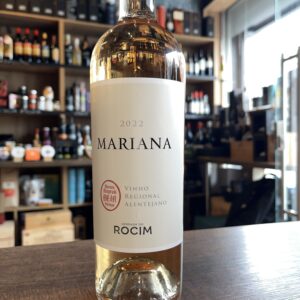 Rocim is the owner of Herdade do Rocim and Vale da Mata. Today, this brand is renowned for the quality of its wine and Cellar. Speaking of its history is speaking of a dream and therefore, it means speaking of the present and future. Because dreams are endless. The “Mariana” Rose is a young and cheerful wine, with generous fruit, freshness and aromatic richness, which reflect the region´s charm. Produced from Touriga Nacional and Aragonez varieties.
Rocim is the owner of Herdade do Rocim and Vale da Mata. Today, this brand is renowned for the quality of its wine and Cellar. Speaking of its history is speaking of a dream and therefore, it means speaking of the present and future. Because dreams are endless. The “Mariana” Rose is a young and cheerful wine, with generous fruit, freshness and aromatic richness, which reflect the region´s charm. Produced from Touriga Nacional and Aragonez varieties. -
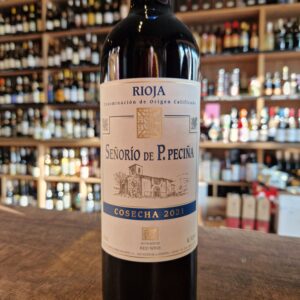 Bodegas Hermanos de Peciña is firmly planted in the old school camp. Although the estate was started only in 1992, its founder, Pedro Peciña had worked for over 20 years prior to that as the head agronomist for La Rioja Alta, learning all facets of production and especially the planting and managing of all the estate’s vineyards. The Peciña winery and vineyards are located in San Vicente, which while technically in the Rioja Alta sub-zone, is not in the vicinity of Haro where most of the other traditional Rioja houses have their cellars. Rather it is located on the northeast side of the Ebro river near the border of the Basque Alavesa zone. These vineyards - many 40 to 60 years old - are actually some of the finest in the appellation as they fall at the foothills of the Sierra Cantabria Mountains at an average of 500 meters, and offer hillside expositions as well as complex and diverse soils. Many of Peciña’s most prized vineyards are actually on north facing slopes which Pedro feels helps give the wines good freshness and delineation. Serve with aperitif, Charcuterie, Cured cheeses, Smoked foods
Bodegas Hermanos de Peciña is firmly planted in the old school camp. Although the estate was started only in 1992, its founder, Pedro Peciña had worked for over 20 years prior to that as the head agronomist for La Rioja Alta, learning all facets of production and especially the planting and managing of all the estate’s vineyards. The Peciña winery and vineyards are located in San Vicente, which while technically in the Rioja Alta sub-zone, is not in the vicinity of Haro where most of the other traditional Rioja houses have their cellars. Rather it is located on the northeast side of the Ebro river near the border of the Basque Alavesa zone. These vineyards - many 40 to 60 years old - are actually some of the finest in the appellation as they fall at the foothills of the Sierra Cantabria Mountains at an average of 500 meters, and offer hillside expositions as well as complex and diverse soils. Many of Peciña’s most prized vineyards are actually on north facing slopes which Pedro feels helps give the wines good freshness and delineation. Serve with aperitif, Charcuterie, Cured cheeses, Smoked foods -
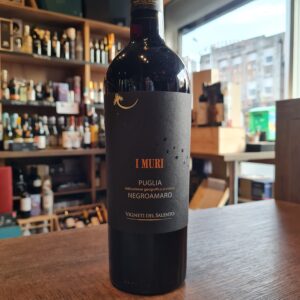 Great value wine from Puglia. This is Farnese’s venture in Puglia. The wines are made at two wineries in the province of Taranto on the western flank of Salento. The style of the wines - fresh whites, soft and generous reds - will be familiar to those who buy their other wines, as winemaker Filippo Baccalaro is the driving force behind this label. Filippo, a native of Piemonte, has been working in Puglia for almost two decades. He was attracted by the rich, ripe flavours of the fruit, and has the potential to capture these flavours with minimal use of technology and a lot of know-how. The vineyards are mostly situated in the communes of Manduria and Sava and are owned by growers with whom Filippo has been working for many years. Production is lower than its potential, which ensures the best quality grapes are selected. The red soils are calcerous clay and rich in iron, minerals and nutrients. 80% of the grapes come from old bush vines and the rest from trained vines that are at least 20 years old. Spring was colder than usual, and this slowed down budbreak and flowering. May and June followed with above average rainfall. Despite this, the Mistral and the north wind persisted for more than 30 days and this allowed vines to keep healthy during the ripening phase delivering extraordinary quality but with 20% lower yields. Enjoy with Pastas, cheeses, Chicken dishes and some not too rich red meats
Great value wine from Puglia. This is Farnese’s venture in Puglia. The wines are made at two wineries in the province of Taranto on the western flank of Salento. The style of the wines - fresh whites, soft and generous reds - will be familiar to those who buy their other wines, as winemaker Filippo Baccalaro is the driving force behind this label. Filippo, a native of Piemonte, has been working in Puglia for almost two decades. He was attracted by the rich, ripe flavours of the fruit, and has the potential to capture these flavours with minimal use of technology and a lot of know-how. The vineyards are mostly situated in the communes of Manduria and Sava and are owned by growers with whom Filippo has been working for many years. Production is lower than its potential, which ensures the best quality grapes are selected. The red soils are calcerous clay and rich in iron, minerals and nutrients. 80% of the grapes come from old bush vines and the rest from trained vines that are at least 20 years old. Spring was colder than usual, and this slowed down budbreak and flowering. May and June followed with above average rainfall. Despite this, the Mistral and the north wind persisted for more than 30 days and this allowed vines to keep healthy during the ripening phase delivering extraordinary quality but with 20% lower yields. Enjoy with Pastas, cheeses, Chicken dishes and some not too rich red meats -
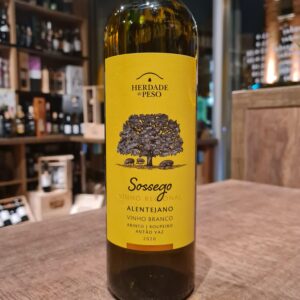 Sogrape Vinhos has been investing in the classic winegrowing regions of Portugal since it was set up in 1942. With a strong presence in the regions of Dão, Douro and (MInho) Vinhos Verdes, their entrance into the Alentejo — the winegrowing region with the highest growth rate in the country — was a natural step. Herdade do Peso Sossego Branco offers the authenticity and immediate passion of Alentejo flavors in a refreshing and aromatic wine. Herdade do Peso is the brand that revitalizes the deepest essence of the region, brought to the surface by the science and know-how of Sogrape Vinhos. The result is the production of exuberant and attractive wines, whose flavors, aromas and colors remind us of life at its best, just like the region where they are born. Sossego White is a refreshing wine that is full of flavour, perfect when served on its own or as na aperitif. It is an excellent accompaniment to various fish dishes, white meats and a variety of salads.
Sogrape Vinhos has been investing in the classic winegrowing regions of Portugal since it was set up in 1942. With a strong presence in the regions of Dão, Douro and (MInho) Vinhos Verdes, their entrance into the Alentejo — the winegrowing region with the highest growth rate in the country — was a natural step. Herdade do Peso Sossego Branco offers the authenticity and immediate passion of Alentejo flavors in a refreshing and aromatic wine. Herdade do Peso is the brand that revitalizes the deepest essence of the region, brought to the surface by the science and know-how of Sogrape Vinhos. The result is the production of exuberant and attractive wines, whose flavors, aromas and colors remind us of life at its best, just like the region where they are born. Sossego White is a refreshing wine that is full of flavour, perfect when served on its own or as na aperitif. It is an excellent accompaniment to various fish dishes, white meats and a variety of salads. -
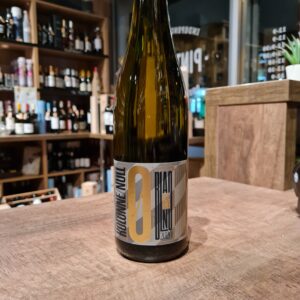 With admirable precision and innovative ideas, the family-run winery Pauly, now in its 3rd generation, succeeds in producing stylish wines with an outstanding character of their own. The winery is not only known for its famous steep slope on the Niederberg-Helden on the Mosel River, but also for the unique slate minerality that gives the wines an elegant, fresh style. The alcohol-free Riesling from Kolonne Null is perfect for all wine enthusiasts who like as little residual sweetness in their wine as possible. Best enjoyed very well chilled at 5 - 7°C. It is perfect as an accompaniment to stir-fried vegetables with fish, omelette with salmon and fennel or vegetable salad with beetroot.
With admirable precision and innovative ideas, the family-run winery Pauly, now in its 3rd generation, succeeds in producing stylish wines with an outstanding character of their own. The winery is not only known for its famous steep slope on the Niederberg-Helden on the Mosel River, but also for the unique slate minerality that gives the wines an elegant, fresh style. The alcohol-free Riesling from Kolonne Null is perfect for all wine enthusiasts who like as little residual sweetness in their wine as possible. Best enjoyed very well chilled at 5 - 7°C. It is perfect as an accompaniment to stir-fried vegetables with fish, omelette with salmon and fennel or vegetable salad with beetroot. -
Out of stock
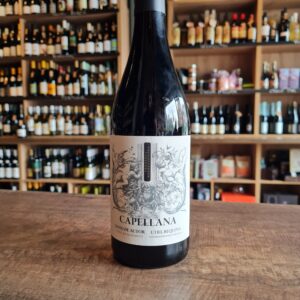 This complex and medium to full-bodied wine is made from Cabernet Sauvignon and Tempranillo grapes. It matured for 7 months in American oak barrels to its full taste. The Cabernet brings strength and abundance here, Tempranillo provides fruit and structure. The result is a wine with character and personality. Cherry juice-colored to brick-red in the glass. Overwhelming scent of cherries, plums and wild berries; the same fruits pickled in rum, all nobly underlaid with fine toasted notes from the wooden barrel. The oak wood is noticeable, but does not dominate the wine. In the mouth the wine is well structured, full and with little surprising tannins. Ideal to accompany grilled meats and different types of stews.
This complex and medium to full-bodied wine is made from Cabernet Sauvignon and Tempranillo grapes. It matured for 7 months in American oak barrels to its full taste. The Cabernet brings strength and abundance here, Tempranillo provides fruit and structure. The result is a wine with character and personality. Cherry juice-colored to brick-red in the glass. Overwhelming scent of cherries, plums and wild berries; the same fruits pickled in rum, all nobly underlaid with fine toasted notes from the wooden barrel. The oak wood is noticeable, but does not dominate the wine. In the mouth the wine is well structured, full and with little surprising tannins. Ideal to accompany grilled meats and different types of stews. -
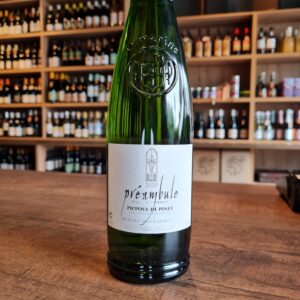 Picpoul de Pinet is a vivid illustration of just how dramatically white wine from the south of France has improved over recent years. Quite simply, the grape variety is Picpoul, or Piquepoul, which is grown around the village of Pinet, and other nearby villages, Florensac, Pomerols. Castelnau de Guers, Mèze and Montagnac. The vineyards form a surprising oasis of white wine in a sea of red wine. The terroir, or soil, explains the reason for this unexpected oasis of white wine. Quite simply the soil is too generous for red wine. It is mainly limestone, which suits white wine, with some clay, sand and appropriately a scattering of fossilised oyster shells. The climate is very much influenced by the sea, with a cooling effect during the nights of the hot summer months, and the vines benefit from maritime breezes. In somes cases it is fair to compare it to Muscadet. Neither packs a punch of flavour, but they provide brilliant accompaniments to the local seafood, and when finely crafted, have deliciously subtle flavours. The cooperative at Pinet, with its brand name L’Ormarine, and striking logo conveying the blue sea, green vines and yellow sun, are amongst the pacesetters of the appellation.
Picpoul de Pinet is a vivid illustration of just how dramatically white wine from the south of France has improved over recent years. Quite simply, the grape variety is Picpoul, or Piquepoul, which is grown around the village of Pinet, and other nearby villages, Florensac, Pomerols. Castelnau de Guers, Mèze and Montagnac. The vineyards form a surprising oasis of white wine in a sea of red wine. The terroir, or soil, explains the reason for this unexpected oasis of white wine. Quite simply the soil is too generous for red wine. It is mainly limestone, which suits white wine, with some clay, sand and appropriately a scattering of fossilised oyster shells. The climate is very much influenced by the sea, with a cooling effect during the nights of the hot summer months, and the vines benefit from maritime breezes. In somes cases it is fair to compare it to Muscadet. Neither packs a punch of flavour, but they provide brilliant accompaniments to the local seafood, and when finely crafted, have deliciously subtle flavours. The cooperative at Pinet, with its brand name L’Ormarine, and striking logo conveying the blue sea, green vines and yellow sun, are amongst the pacesetters of the appellation.


